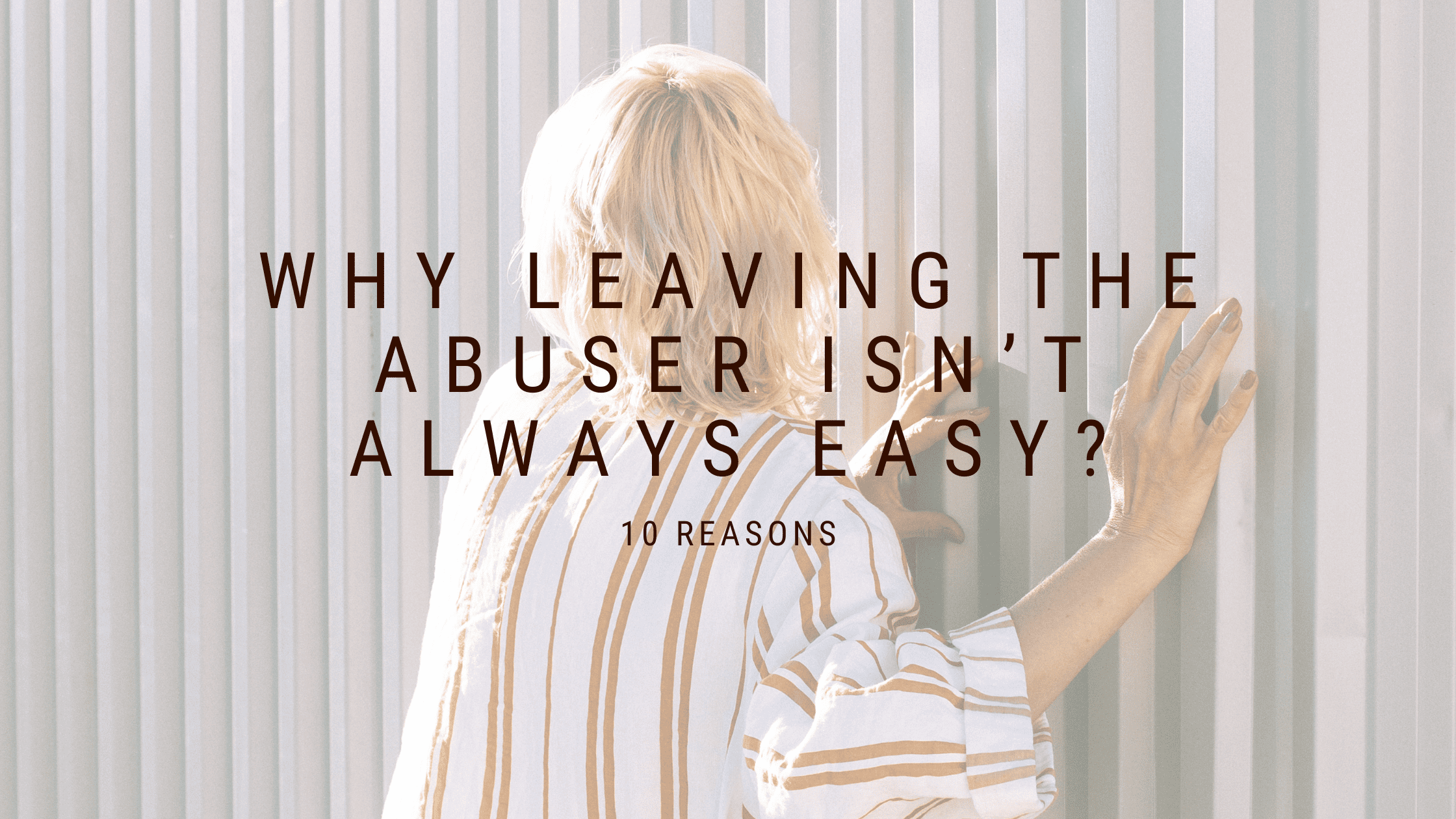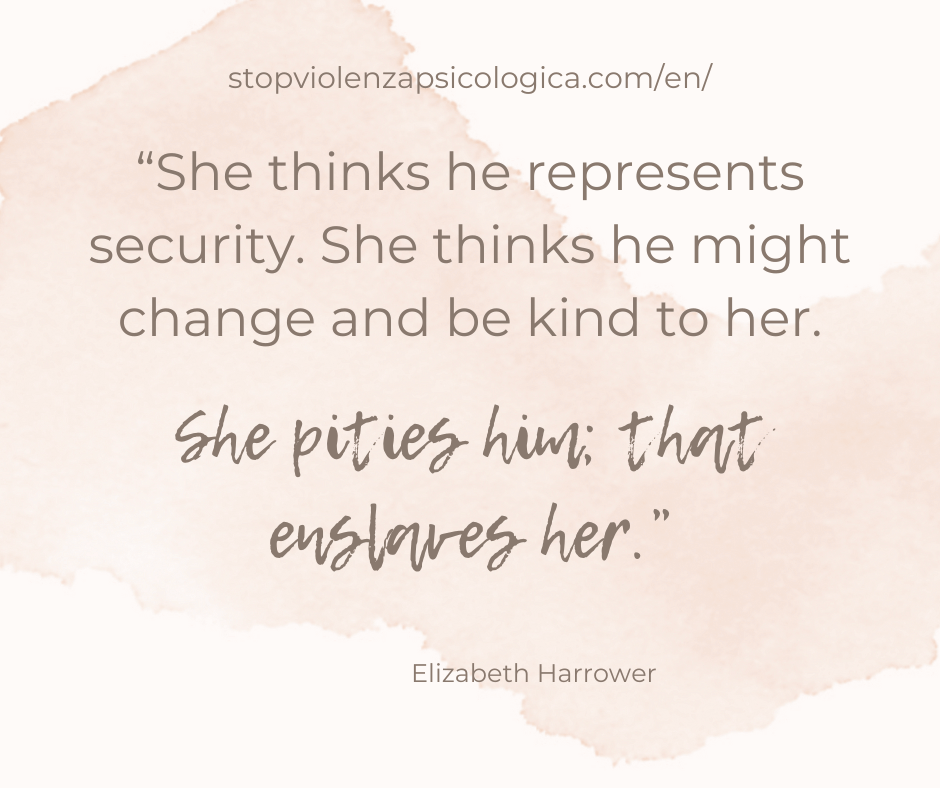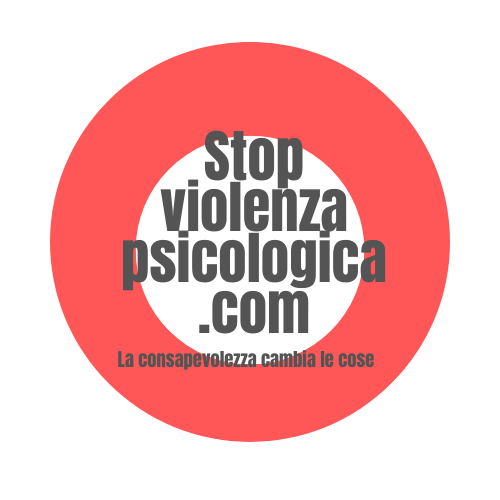How to Support Abuse Victims: Understanding Why Leaving Isn’t Always Easy

In this post, I will seek to investigate and explain (from someone who has experienced it firsthand) the reasons why an abused person finds it so difficult to leave the partner who continues to mistreat them. I will discuss the ten reasons why people remain in unhealthy or abusive relationships.
“Why didn’t you leave earlier?” – a very complex issue
Unfortunately, it’s often difficult for victims of psychological abuse to understand fully the severity of the abuse they’re experiencing, or they may be in a state of denial. Paradoxically, this denial can be triggered or exacerbated by questions or pressure from friends or family.
And when the victim finally finds the courage to leave their abuser, the last thing they want to hear is “Why didn’t you leave earlier?”. Simply because they may not yet have an answer, not even for themselves. They still need to process the trauma, reach full awareness of what happened, and find a way to begin healing.
Despite being a growing phenomenon, psychological abuse (as well as physical abuse) is rarely discussed. This is why even those who want to help often lack the right attitude, knowledge, or tools to do so.
But it’s not just that.
The people close to us, who assist us in healing and “rebirth,” care deeply about us and wish we hadn’t experienced abuse, disrespect, fear, submission, and trauma. It’s also for this reason that the question arises spontaneously: “but why didn’t you leave earlier?”.
Unfortunately, it’s not only members of our support group who ask us this question. Often, it’s the abusers themselves who ask it, as was the case of mine.
“If I was so terrible, why did you stay with me?”
The abuser
It’s nothing more than a way to cover up the traces of abuse and to point the finger at the victim. He even used it in court, and they let him.
Every time I heard this question, I felt myself freeze inside. I felt stupid. And I hated myself even more for enduring, for sacrificing so much. These are emotions that don’t help with healing.
I’ve noticed that many people find this topic quite interesting and readily jump into assumptions as soon as they learn about any kind of violence.
Unfortunately, almost always the blame is attributed to the victim for not being smart enough, or naive enough; brave enough, or fearful enough; consenting enough, or hostile enough; modest enough and just a little less brazen, and a little less interested. In short, everyone’s good at building theories in the name of good old gossip.
And that’s exactly where education needs to come in to increase awareness of this rampant phenomenon.
Informing and educating the public is essential because by doing so, victims of abuse may feel a little less judged and a little more encouraged to defend themselves and say enough is enough.
Because by doing so, over time, there will be fewer victims.
So, let’s get to the point and try to understand why we find it so difficult to leave or distance ourselves from a partner who abuses us.
10 Reasons Why People Stay in Unhealthy or Abusive Relationships
#1 – Subtle Manipulative Tactics
#2 – Tendency to Give the Benefit of the Doubt
#10 – Lack of Education and Awareness

Staying in unhealthy or abusive relationships is a complex issue that cannot be attributed to a single factor.
It’s a combination of emotional, psychological, social, and economic factors that can make it difficult to leave these situations. Let’s delve into the details.
The first two reasons are drawn from George K. Simon’s book “In Sheep’s Clothing: Understanding and Dealing with Manipulative People”, and they have personally resonated with me. I find they mostly refer to the initial period of the relationship with the abuser when the love bombing begins to diminish. You sense something strange in the air, but you can’t quite grasp what it is, and you don’t trust your instinct. Here’s why:

#1 – Subtle Manipulative Tactics
The abuser often employs subtle manipulative tactics. The abuse isn’t blatant.
Your instinct might try to warn you that something is off, that your partner is trying to dominate and control you, and you find yourself unconsciously always on the defensive without understanding the real reason.
You can’t validate your feelings because you can’t point to clear evidence of abuse.

#2 – Tendency to Give the Benefit of the Doubt
Many people have been raised under the influence of a mindset that implies that all of us, to varying degrees, have some issues that can sometimes make us “difficult” to deal with.
So, while your instinct tells you to run for the hills, your mind argues that maybe your partner is just scared or has some unresolved trauma. And since most of us don’t want to be labeled as insensitive and cruel, we prefer not to make negative judgments but rather give the benefit of the doubt. We try to avoid thinking that our partner’s behavior and intentions towards us are truly malevolent.

#3 – Emotional Dependency
One of the main reasons people stay in an abusive relationship is emotional dependency. Abusers often manipulate their victims into believing they are worthless or unlovable, making it difficult for the victim to imagine life without the abuser. This emotional manipulation erodes self-esteem, making it difficult for the victim to muster the courage to leave.

Emotional dependency can have several causes:
1) Seeking Validation and Acceptance
One of the primary reasons for emotional dependency in abusive relationships is the relentless desire for validation and acceptance. Abusers often enact a cycle of manipulation and intermittent reinforcement, alternating moments of kindness with moments of cruelty. Victims become emotionally dependent on occasional affection and approval, creating a desperate need for validation from the abuser, even amidst the abuse.
2) Fear of Abandonment
Abusers often exploit the fear of abandonment, threatening victims with isolation or harm if they attempt to leave. This fear, deeply rooted in emotional dependency, paralyzes victims, making it difficult to break free. The prospect of being alone, coupled with the abuser’s threats, amplifies emotional dependency, trapping individuals in the cycle of abuse.
3) Low Self-Esteem
Emotional dependency often intertwines with low self-esteem. Victims, worn down by ongoing emotional abuse, begin to doubt their own worth and believe they deserve mistreatment. The abuser’s manipulation erodes self-confidence, making them emotionally dependent on any semblance of affection, even at the cost of enduring abuse.
4) Trauma Bonding
Emotional dependency in abusive relationships is further complicated by the phenomenon known as trauma bonding. Victims form a strong emotional bond with their abusers due to intense shared experiences, including moments of kindness amidst the abuse. This complex emotional bond, based on fear, kindness, and confusion, deepens emotional dependency, making it incredibly difficult to break free.

#4 – Fear
Fear plays a significant role in keeping people trapped in abusive relationships. Victims fear retaliation, physical harm, or even death if they attempt to leave. The abuser may also threaten to harm their loved ones, forcing the victim to stay in the relationship out of fear for their own safety and that of their family.
Understanding the various dimensions of fear is essential to understanding why people stay in abusive relationships despite the obvious dangers.
1) Fear of Physical Harm
Perhaps the most immediate and tangible fear in abusive relationships is the threat of physical harm. Abusers often use violence to instill fear in their victims. This fear becomes paralyzing, making it incredibly difficult for people to leave the relationship, as they fear the consequences of attempting to escape.
2) Fear of Retaliation
Victims often fear retaliation from their abusers, not only against themselves but also against their loved ones. The fear of harm to family members, especially children, intensifies the sense of powerlessness.
3) Fear of Loneliness
Abusers strategically isolate their victims from friends, family, and support networks, fueling a deep fear of loneliness. Victims fear the prospect of being completely alone, without emotional or financial support. This fear of social isolation creates a sense of dependence on the abuser, making it difficult to imagine a life outside the abusive relationship.
4) Fear of Financial Insecurity
Economic dependence on the abuser often generates an overwhelming fear of financial instability. Victims, especially those financially dependent on their abusers, worry about their ability to support themselves and their children if they leave. This fear of poverty becomes a significant obstacle, making the prospect of independence seem daunting and unattainable.
5) Fear of Public Humiliation and Shame
Victims fear the judgment and stigma associated with being in an abusive relationship, leading them to internalize their suffering. The fear of social condemnation prevents many individuals from seeking help or disclosing their experiences, trapping them in silence.
6) Fear of Losing Child Custody
For victims with children, the fear of losing custody often paralyzes their actions. Abusers exploit this fear, threatening to use the legal system against their victims. The prospect of being separated from their children or, worse, losing custody to the abusive partner intensifies fear and discourages attempts to leave the relationship.
7) Fear of Emotional Setbacks
Emotional manipulation and gaslighting by abusers create fear of emotional setbacks. Victims fear the psychological impact of abandonment: anxiety, depression, and the emotional consequences of abuse. This fear can be so overwhelming that people may choose to endure the abuse, believing it to be the lesser evil, often without realizing they are already suffering from anxiety and/or depression as a result of the abuse.
Overcoming these fears requires immense courage, external support, and profound inner change.
Empowering victims to recognize their worth, providing safe spaces to disclose their experiences, and offering resources for legal and financial assistance are crucial steps in dismantling the suffocating grip of fear.

#5 – Financial Dependency
Many victims rely on their abusers for financial support, making it difficult to become independent. The fear of financial instability and poverty can prevent people from leaving the relationship, especially if they have children to support.
This form of dependency can be as confining as physical chains, forcing people to endure abuse despite their desire for freedom and security.

Here are the aspects to highlight:
1) Lack of Economic Resources
Limited economic resources, often exacerbated by social inequalities, cause victims to rely financially on their abusers. Without the means to support themselves and dependents independently, victims perceive leaving as an insurmountable challenge. The fear of homelessness, hunger, and poverty keeps them trapped in a cycle of abuse.
2) Difficulty in Finding Employment
Abusers often sabotage their victims’ job opportunities, making it difficult to obtain or maintain employment. Tactics such as manipulation, harassment, threats, or control of transportation hinder victims from working outside the home. The absence of stable employment further exacerbates financial dependency, leaving victims without financial autonomy.
3) Financial Control
Abusers often exert total control over finances, limiting victims’ access to bank accounts, credit cards, and even cash. This control extends to monitoring every penny spent, creating a sense of powerlessness and dependency. Victims are left without the means to escape or achieve independence, making them vulnerable to ongoing abuse.
4) Fear of Retaliation
Victims fear retaliation if they attempt to achieve financial independence. Abusers exploit this fear, threatening to ruin their credit, sabotage job opportunities, or deplete their savings. The fear of repercussions amplifies financial dependency, making it incredibly difficult for victims to break free from the abusive relationship.
5) Child Custody and Financial Stability
For victims with children, concerns about child custody amplify financial dependency. The fear of losing custody due to economic instability or lack of stable housing deters victims from leaving. Abusers exploit this fear, using it as a means to maintain control and prevent victims from seeking legal recourse.
6) Isolation and Lack of Support
Abusers isolate their victims, severing ties with friends and family who could offer support. This isolation creates a lack of emotional and financial support networks. Victims, devoid of external resources, remain trapped in financial dependency, unable to envision a future without the abuser’s financial control.

#6 – Isolation
Abusers often isolate their victims from friends and family, cutting off their support systems. When a victim is socially isolated, they lack the emotional and practical support needed to leave the relationship. This isolation can create a sense of helplessness and increase dependence on the abuser.
Isolation limits victims’ exposure to different perspectives and opinions. Abusers exploit this narrow view of the world, further spotlighting their victims, distorting reality, and undermining their self-confidence. Without external validation of their experiences, victims may begin to doubt their perceptions, internalizing the abuser’s version of events.
Fear of Judgment and Stigma
Isolated victims fear judgment and stigma from the outside world. They may believe their experiences are unique or shameful, making disclosing abuse a daunting prospect. This fear further deepens their isolation, preventing them from seeking help or confiding in others.
Isolation perpetuates a cyclical pattern of manipulation and abuse.
Abusers isolate victims to strengthen their control, further eroding their self-esteem and trust. As victims become more isolated, their dependence on the abuser intensifies, reinforcing the cycle of abuse.

#7 – Hope for Change
In some cases, victims remain in abusive relationships because they cling to the hope that the abuser will change. Abusers may apologize, promise to seek help, or temporarily show kindness, creating a cycle of hope and disappointment. This cycle can make it difficult for the victim to break free, as they believe the abuser’s behavior can be altered.

Here are the aspects that reinforce these beliefs:
1) Nostalgia for Past Affection
Victims of abusive relationships often remember moments of genuine affection and kindness from their partners, especially during the early stages of the relationship. These memories create a sense of nostalgia that leads victims to hope that the loving partner they fell for will re-emerge, erasing the pain of abuse. This hope becomes a powerful force, clouding judgment and obscuring the harsh reality of the present.
2) Promises of Change
Abusers, aware of their victims’ hope for change, can manipulate their emotions by promising to seek help, undergo therapy, or change their behavior. These reassurances, coupled with temporary displays of remorse, reignite the victims’ hope. The promise of a better future becomes a glimmer of hope in the darkness, encouraging victims to endure abuse in anticipation of the abuser’s transformation.
3) Love and Emotional Investment
Love, combined with emotional investment in the relationship, reinforces the hope for change. Victims invest not only time and energy but also emotions, dreams, and aspirations in the relationship. The fear of abandoning this investment, coupled with the hope that things will improve, creates a powerful emotional tug-of-war that makes it difficult to break free.
4) Belief in Second Chances
Society often emphasizes the concept of second chances and the power of redemption. Victims, influenced by these beliefs, hope that their abusers can change, especially if given the opportunity and support to do so. This social narrative fuels their optimism, making them willing to endure present suffering for the possibility of a harmonious future.
Abusers cunningly manipulate victims’ hope for change to maintain control. They may alternate episodes of abuse with moments of kindness, creating confusion and false hope. This manipulation deepens victims’ emotional investment, making it harder for them to recognize the cyclical nature of abuse and break the pattern.
6) Lack of Awareness
Victims may not be aware of abuse patterns, believing their situation to be unique or that their abusers’ behavior will eventually improve. This lack of understanding of abuse dynamics amplifies their hope for change, preventing them from recognizing the need to seek help and leave the relationship.

“She thinks he represents security. She thinks he might change and be kind to her. She pities him; that enslaves her.”
Elizabeth Harrower, The Watch Tower

#8 – Low Self-Esteem
Individuals with low self-esteem may believe they deserve abuse or cannot find a better relationship. Abusers often exploit this vulnerability, reinforcing the victim’s negative self-image and making it difficult for them to leave and seek a healthier relationship.
1) Negative Self-Perception
Individuals with low self-esteem tend to harbor negative beliefs about themselves. They may perceive themselves as unlovable, undeserving of happiness, or inherently flawed. These negative self-perceptions make it difficult to believe they deserve better treatment, trapping them in relationships that reinforce their low self-esteem.
2) Fear of Rejection and Abandonment
Victims with low self-esteem often intensely fear rejection and abandonment. The prospect of being alone, without the abusive partner, can evoke paralyzing fear. Rooted in low self-esteem, this fear causes victims to hesitate to leave because they believe they cannot find another relationship and are doomed to loneliness.
3) Tolerance for Mistreatment
Low self-esteem can lead individuals to tolerate mistreatment and abuse because they believe they deserve it. They may think that abusive behavior is a reflection of their worthlessness. This distorted self-perception makes it difficult to recognize abuse and assert their right to be treated with respect and kindness.
4) Dependency on External Validation
Individuals with low self-esteem often rely heavily on external validation to feel a sense of self-worth. Abusers exploit this dependency by alternating periods of affection with periods of cruelty. Moments of kindness become a lifeline for victims, reinforcing their belief that the abuser’s affection validates their existence, even if it is fleeting and sporadic.
5) Limited Decision-Making Capacity
Low self-esteem can hinder an individual’s ability to make assertive decisions, especially when it comes to personal relationships. Victims may lack confidence in their judgment, second-guess their choices, or believe they are not worthy of better treatment. This self-doubt hampers their ability to leave the abusive relationship.
6) Cycle of Self-Sabotage
Individuals with low self-esteem may engage in self-sabotaging behaviors, consciously or unconsciously. They may stay in abusive relationships as a form of self-punishment, believing they deserve the suffering. This cycle of self-sabotage perpetuates their sense of worthlessness, making it difficult to break free from abuse.
7) Lack of Self-Compassion
Victims with low self-esteem often lack self-compassion, berating themselves for their perceived flaws. This self-criticism reinforces the belief that they deserve abuse, further eroding their self-esteem. The absence of self-compassion makes it difficult to advocate for their well-being and seek help.

#9 – Lack of Support Services:
Limited access to support services such as shelters, counseling, legal assistance, or therapy can hinder a person’s ability to leave a violent relationship. Without adequate resources, victims may feel they have nowhere to turn for help.
1) Limited Access to Counseling and Therapy
Counseling and therapy are crucial for abuse victims as they provide them with the necessary tools to heal emotionally and psychologically. However, limited access to specialized and affordable counseling services can prevent victims from addressing the trauma they have endured. The lack of therapeutic support prolongs their suffering, making it difficult to overcome the emotional scars of abuse.
2) Insufficient Legal Assistance and Advocacy
Victims often need legal assistance to address complex issues such as restraining orders, custody battles, or divorce proceedings. However, the scarcity of legal assistance and advocacy services leaves many victims without the resources needed to protect themselves and their children. This lack of support may discourage people from resorting to legal avenues, leaving them vulnerable to ongoing abuse.
3) Inadequate Shelter and Housing Options
Safe and secure housing is essential for people fleeing from violent relationships. Insufficient shelter options, especially those tailored to the specific needs of abuse survivors, force victims to remain with their abusers out of sheer desperation. The lack of accessible shelters and affordable housing perpetuates their vulnerability, hindering their escape from the violent environment.
4) Inadequate Financial Assistance
Financial stability is crucial for survivors aiming to rebuild their lives independently. However, limited financial assistance programs and job opportunities leave victims financially dependent on their abusers. The lack of financial resources confines them in a violent relationship as they are unable to support themselves and their dependents without external assistance.
5) Shortage of Support Groups and Community Resources
Support groups provide a sense of community, understanding, and validation for abuse survivors. However, the scarcity of such groups, especially in rural or underserved areas, leaves victims without a support network. The absence of community resources further exacerbates their isolation, making it difficult to find comfort and empowerment.
6) Cultural and Linguistic Barriers
Cultural and linguistic differences can serve as significant barriers for victims seeking support services. The limited availability of services in specific languages or tailored to cultural norms may alienate survivors, making them reluctant to seek help. Cultural stigma and the lack of culturally sensitive resources exacerbate their isolation, preventing them from accessing the assistance they desperately need.

#10 – Lack of Education and Awareness
The lack of education and awareness about the dynamics of abuse can prevent victims from recognizing their situation as abusive.
Insufficient public awareness campaigns in schools, workplaces, and communities perpetuate myths and misconceptions about domestic violence. This lack of understanding leaves victims unaware of available resources and uncertain about how to seek help.

Conclusion
As we have seen, there are several reasons why people remain in unhealthy or violent relationships. These reasons are deeply rooted in psychological, emotional, social, and economic factors.
Overcoming these challenges is difficult.
Comprehensive support systems are needed.
Awareness is crucial, both on the part of victims and society.
Education and social efforts are necessary to empower victims to break the cycle of abuse.
By promoting a culture of self-acceptance and self-compassion, societies can enable individuals to recognize their intrinsic value, allowing them to escape from violent relationships and embrace lives defined by love, respect, and fulfillment.
Of course, we, the survivors, must do our part.
We must first engage in extensive introspection to understand what makes us easy prey for abusers.
We must work to overcome the trauma resulting from psychological violence, which often leads to post-traumatic stress disorder (PTSD) or complex post-traumatic stress disorder (CPTSD).
We must heal and share our experience with others to raise awareness and sensitize people to the dangers of psychological abuse.
Thank you for reading this article until the end, and I leave you with this message:
don’t judge yourself,
and don’t let the judgment of others hinder your mental clarity and decision-making power.
I sincerely hope this post has been helpful to you. Help me spread awareness by sharing it with your friends and leaving a comment below. Thank you!

Risorse:
“In Sheep’s Clothing: Understanding and Dealing with Manipulative People” by George K. Simon
“The Verbally Abusive Relationship, Expanded Third Edition: How to recognize it and how to respond” by Patricia Evans
STAY/LEAVE DECISION-MAKING IN NON-VIOLENT AND VIOLENT DATING RELATIONSHIPS, Jennifer E. Copp, Peggy C. Giordano, Monica A. Longmore, and Wendy D. Manning
Conceptualising the separation from an abusive partner as a multifactorial, non-linear, dynamic process: A parallel with Newton’s laws of motion, Daniela Di Basilio, Fanny Guglielmucci, and Maria Livanou
